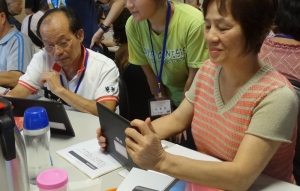Keeping Tabs on Their Health
April 28, 2016 / by Vincent Lim and Joanna Scott- Giving
- Research
USC Trustee Daniel M. Tsai and his wife, Irene Chen, MA ’83, were concerned about the growing aging society in Taiwan, a country that has faced challenges with low fertility rates in recent decades. Both have aging parents themselves and wanted to find a way to empower older adults through technology.
They found it in a research initiative led by Shinyi Wu, associate professor at the USC School of Social Work and associate director of innovations in health at the USC Edward R. Roybal Institute on Aging.
In collaboration with Hsinyi (Cindy) Hsiao, research assistant professor; Iris Chi, Chinese-American Golden Age Association/Frances Wu Chair; and Yi-Chuan Tseng, project manager, Wu explored whether tablet computers could be an effective medium among older adults to prevent disease, decrease isolation and improve their general well-being.
“If we spend more time on older adults, their full potential can be developed,” Chen said. “Their wisdom can be passed down to the young generation, and they deserve opportunities to learn new things.”
Tsai and Chen funded the Intergenerational Mobile Technology Opportunities Program (IMTOP) through their charitable foundation. To date, over 100 older adults in Taipei, Taiwan, have now participated in an initial training program for self-care management of diabetes.
IMTOP utilizes young volunteers from local universities in Taiwan to train older adults in using an app through their tablet to access health information and seek help, if needed. The app allows the recording of biomarkers and health behaviors for self-management of disease. The data then helps patients’ communication with their health care providers.
The app was developed by Wu, along with Shao-Hsuan Liang, Chungyi Huang, Xiaoxin Lufei and Siying Wang, graduate students from the School of Social Work and the USC Viterbi School of Engineering.
“The intergenerational aspect of IMTOP benefits both older adults and the young volunteers,” Wu said. “The older adults feel energized by being around the younger students, and many of these students are learning how to effectively communicate with their elders for the first time. Some are now even considering careers in aging.”
Chen is gratified that IMTOP is improving the quality of life for older adults and hopes it will become a standardized model among nonprofit health care institutions throughout Taiwan, and ideally, around the world.
“I would like to invite new partners in Taiwan, such as the Ministry of Education, senior centers, continuing education centers and universities, to implement IMTOP,” she said.
A high percentage of the older adults who have participated in the training program are using the self-care app on their tablets. Wu’s research team also conducted focus groups, and participants were overwhelmingly interested in the development of additional health care apps and training courses in the future.
“We are pleased to see that the IMTOP project is changing how older adults view technology and take charge of their health care needs,” Wu said. “We hope to continue this momentum as we initiate our program at other locations in Taiwan and look forward to seeing the final results.”
To reference the work of our faculty online, we ask that you directly quote their work where possible and attribute it to "FACULTY NAME, a professor in the USC Suzanne Dworak-Peck School of Social Work” (LINK: https://dworakpeck.usc.edu)
